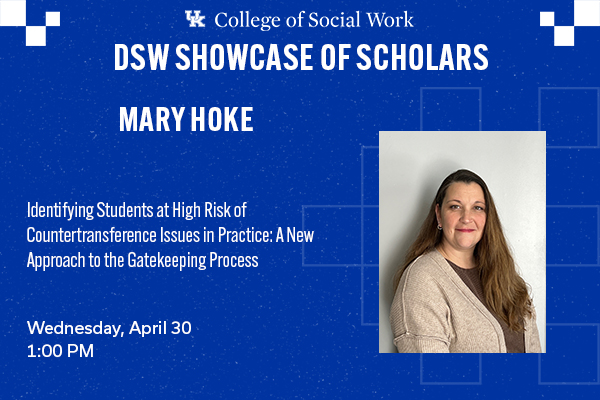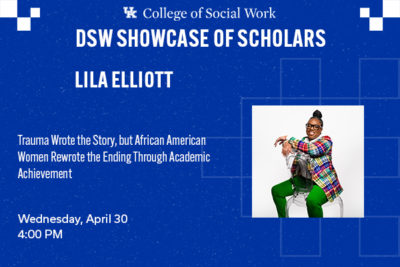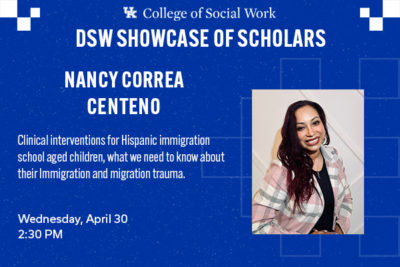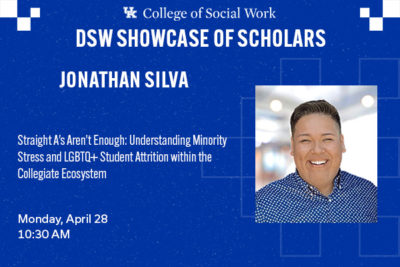DSW Candidate – Mary Hoke, 1:00 PM-2:15 PM
$0.00
Virtual Showcase of DSW Scholars 2025 Event!
Identifying Students at High Risk of Countertransference Issues in Practice: A New Approach to the Gatekeeping Process
DSW Candidate – Mary Hoke, MSW, LCSW
Wednesday, April 30, 2025
1:00 PM-2:15 PM Eastern Time Zone
Credit Hours: 1.0 (ACE)
Description
Identifying Students at High Risk of Countertransference Issues in Practice: A New Approach to the Gatekeeping Process
It is the job of a social work educator to ensure that students become competent, empathetic, skilled workers. Many students choose social work as their major because of past experiences or traumas, leading them to want to help others (Mercer et al., 2023). Mercer et al. (2023) report that students within the social work major reported higher childhood trauma occurrences than those in other disciplines. The role of a social worker is to focus on the client’s needs and use self-reflection and self-awareness to set their own values, beliefs, and experiences aside. While this can fuel an individual’s drive to help people it can also have unintended consequences.
If a person has not identified and dealt with their own experiences or trauma they can be triggered when working with clients that share similar experiences. This can cause triggering and countertransference issues, making them ineffective helpers (Mercer et al., 2023). It falls on the social work faculty to ensure that students have the coping skills needed before entering their practicum to properly deal with triggering or countertransference issues.
This presentation will discuss how current BSW faculty are identifying students at high risk of countertransference and present a new approach to the gatekeeping process using relational theory and Chickering’s theory of Identity. The integration of questions related to past experiences during the formal admission process can assist faculty in raising students’ awareness of possible areas of concern as well as provide a framework for referrals to services or increased education on self-reflection and coping skills related to the negative effects of countertransference.
Learning Objectives:
Upon completion of this conference, participants will be able to:
- Understand what countertransference is and how it can affect social workers in practice.
- Understand the theoretical background of Chickering’s theory of identity and relational theory and how it can be used to address the issue of countertransference in practice.
- Name possible approaches to identify students at high risk of countertransference before entering practice.
Delivery Method: Live Interactive Training via Zoom Video Conferencing
Credit Hours: 1.0 (ACE)
Target Audience: This conference is intended for social workers and students.
Accreditation: University of Kentucky College of Social Work, Provider # 1377, is approved as an ACE provider to offer social work continuing education by the Association of Social Work Boards (ASWB) Approved Continuing Education (ACE) program. Regulatory boards are the final authority on courses accepted for continuing education credit. ACE provider approval period: 9/29/22-9/29/25. Social workers participating in this conference will receive up to 15 general continuing education credits.
Claiming CE Credit: Instructions for claiming CE credit will be disseminated at the beginning of each session.
Questions: If you have any questions regarding CE credit or to report a grievance, please contact Christina Krantz at Christina.Krantz@uky.edu. For technical assistance, please contact lmshelp@uky.edu.
Disclaimer: The views and opinions expressed in these presentations are those of the individual presenters and do not necessarily reflect the official policies or positions of the University of Kentucky or the College of Social Work. The inclusion of any topics, perspectives, or discussions is intended for academic engagement and does not constitute endorsement by the institution.



